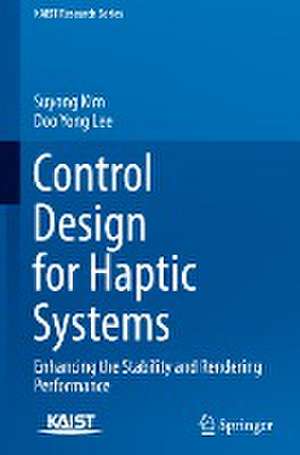Control Design for Haptic Systems: Enhancing the Stability and Rendering Performance: KAIST Research Series
Autor Suyong Kim, Doo Yong Leeen Limba Engleză Hardback – feb 2024
Preț: 726.37 lei
Preț vechi: 885.82 lei
-18% Nou
Puncte Express: 1090
Preț estimativ în valută:
139.02€ • 144.58$ • 116.33£
139.02€ • 144.58$ • 116.33£
Carte disponibilă
Livrare economică 21 februarie-07 martie
Preluare comenzi: 021 569.72.76
Specificații
ISBN-13: 9789819985975
ISBN-10: 9819985978
Pagini: 140
Ilustrații: XIII, 140 p. 112 illus., 79 illus. in color.
Dimensiuni: 155 x 235 mm
Greutate: 0.41 kg
Ediția:1st ed. 2024
Editura: Springer Nature Singapore
Colecția Springer
Seria KAIST Research Series
Locul publicării:Singapore, Singapore
ISBN-10: 9819985978
Pagini: 140
Ilustrații: XIII, 140 p. 112 illus., 79 illus. in color.
Dimensiuni: 155 x 235 mm
Greutate: 0.41 kg
Ediția:1st ed. 2024
Editura: Springer Nature Singapore
Colecția Springer
Seria KAIST Research Series
Locul publicării:Singapore, Singapore
Cuprins
Introduction to Haptic Systems.- Control of Haptic Systems.- Input-to-State Stability (ISS) and Haptic Control.- Transparency of Haptic Systems.- Haptic Systems under Time Delay.
Notă biografică
Suyong Kim received the B.S. (Magna Cum Laude), M.S., and Ph.D. degrees from Department of Mechanical Engineering, Korea Advanced Institute of Science and Technology (KAIST), Daejeon, Korea in 2015, 2017, and 2022, respectively. He was a Postdoctoral Researcher at KAIST, and is a Staff Engineer at Global AI Center of Samsung Research. His research interests include medical robotics, control, and haptics. He received the scholarship of Kwanjeong Educational Foundation from 2015 to 2016, and Best Paper Awards of Korean Society of Mechanical Engineers (KSME) Conferences in 2017 and 2022.
Doo Yong Lee received the B.S. degree from Department of Control and Instrumentation Engineering, Seoul National University, Korea in 1985, and the M.S. and Ph.D. degrees from Department of Electrical, Computer, and Systems Engineering, Rensselaer Polytechnic Institute, Troy, NY, USA in 1987 and 1993, respectively. He was a Postdoctoral Research Associate at Rensselaer Polytechnic Institute from 1993 to 1994. He joined Department of Mechanical Engineering, Korea Advanced Institute of Science and Technology (KAIST) in 1994, and is POSCO Endowed Chair Professor of KAIST. He was Director of Health Technology Infrastructure of Korea Health Industry Development Institute from 2010 to 2012, and Head of Department of Mechanical Engineering, KAIST from 2017 to 2021. He was President of Institute of Control, Robotics, and Systems (ICROS) in 2021. His research interests include robotics and simulation with medical applications, especially robotic medical devices, and high-fidelity interactive medical simulation with haptic interface for training and planning purposes. He is a member of National Academy of Engineering of Korea, and Fellow of ICROS. He received Korea Prime Minister’s Commendation in 2018 for technical contributions to the field.
Doo Yong Lee received the B.S. degree from Department of Control and Instrumentation Engineering, Seoul National University, Korea in 1985, and the M.S. and Ph.D. degrees from Department of Electrical, Computer, and Systems Engineering, Rensselaer Polytechnic Institute, Troy, NY, USA in 1987 and 1993, respectively. He was a Postdoctoral Research Associate at Rensselaer Polytechnic Institute from 1993 to 1994. He joined Department of Mechanical Engineering, Korea Advanced Institute of Science and Technology (KAIST) in 1994, and is POSCO Endowed Chair Professor of KAIST. He was Director of Health Technology Infrastructure of Korea Health Industry Development Institute from 2010 to 2012, and Head of Department of Mechanical Engineering, KAIST from 2017 to 2021. He was President of Institute of Control, Robotics, and Systems (ICROS) in 2021. His research interests include robotics and simulation with medical applications, especially robotic medical devices, and high-fidelity interactive medical simulation with haptic interface for training and planning purposes. He is a member of National Academy of Engineering of Korea, and Fellow of ICROS. He received Korea Prime Minister’s Commendation in 2018 for technical contributions to the field.
Textul de pe ultima copertă
This book aims at the upper-class undergraduate and the graduate students, and practicing engineers in the disciplines of mechanical, electrical, and computer engineering, with background knowledge of control. This book, first, explains the components of the haptic systems that are gaining popularity in the virtual reality simulations, the metaverse applications, as well as the remotely operated robotic systems. Next, the book introduces the previous and current widely-adopted methods for modeling and control of the haptic systems. The important metrics of performance such as stability and transparency of the haptic systems are explained and analyzed. Shortcomings of the current methods are discussed using these metrics. The book, then, explains the theories on the input-to-state stability (ISS), and shows how to formulate the control of haptic systems into the ISS framework. Step by step process of control design using the formulation is detailed, and better results are shown with experiment examples. The book develops further the presented approach to secure improved performance under selected issues. For example, better transparency of the haptic rendering, and handling of constant or time-varying time delay present in the haptic control systems.
Caracteristici
Covers comprehensive design of control of the haptic systems Presents an advanced approach to control design of the haptic systems Deals with the most challenged technical problem that is hindering widespread employment of the haptic systems













